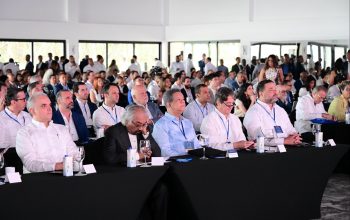news
Inclusion of New Technology in Education Begins with Quality of Teachers
March 19, 2015
The panel “Technology in Teacher Training” opened the Forum on Higher Education and Innovation, organized by Funglode/GFDD, Microsoft Dominicana and the Ministry of Higher Education, Science and Technology (MESCyT in Spanish).
The Center for Education Studies of the Fundación Global Democracia y Desarrollo (Funglode) and its sister institution in the United States, the Global Foundation for Democracy and Development
(GFDD), in coordination with Microsoft Dominicana and the Ministry of Higher Education, Science and Technology (MESCyT) kicked of the Forum on Higher Education and Innovation on Wednesday, March 18th.
The first panel, “Technology in Teacher Training,” which opened the forum, included Alberto Aunchayna, Professor of Red Qualitas; Álvaro Torres Salazar, Director General of Mariano Gálvez University of Guatemala, and Ana R. Guadalupe, former Rector of the
University of Puerto Rico.
“The process of teaching and learning for educational development begins with the quality of teachers who must possess personal knowledge of technology and, in practice, should influence the educational curriculum,” said Mr. Aunchayna.
Addressing the topic, “Learning Design in the 21st Century,” the Red Qualitas Professor said the current educational system “is based on the
image and likeness of a 19th century school, with teachers trained in the 20th century,” adding that the challenge will be to integrate teachers into this century’s technological advances.
Mr. Aunchayna noted, “the keys to developing the education system in line with new trends include removing ourselves from memorization and reproduction and focusing on teaching practices that promote 21st century skills and abilities as well as a genuine integration of Information and Communications Technology (ICT).”
For his part, Álvaro Torres Salazar said, “the
learning process lies not only in teaching but also on students whose responsibility is to expand their knowledge.”
Mr. Torres explained that to implement innovative models, it is necessary to train teachers in technology, because “if teachers do not know how to use technology, instead of an investment, they are an expenditure.”
These days students are characterized by being in direct contact with information,
living in a technological world and having the ability to compare data in real time, which enables “learning to occur where ever a student can interact with information,” added Mr. Torres Salazar.
“Integration of Technology at the University of Puerto Rico,” was the topic presented by Ana R. Guadalupe, who described the changes her university underwent as part of its implemenation of new technologies for students, teachers and
administrative personnel.
Ms. Guadalupe urged the rectors not to forget the needs of the faculties and to keep in mind the resources available for developing innovative technological projects at universities.
“Technology can help in the daily work of the universities, through the implementation of virtual platforms where students, faculty and staff can offer suggestions on the development of the institution,” said Ms.
Guadalupe.
Hosts of the meeting, Marco Herrera, Executive Director of Funglode; Juan Luis Lozada, Regional Education Director of Microsoft Dominicana, and Ligia Amada Melo, Minister of Higher Education, Science and Technology (MESCyT), all agreed on the relevance these types of events have on teacher training and improving the quality of education in the Dominican Republic.
About the Forum
The Forum on Higher Education and
Innovation is directed at university rectors, deans and professors. It was held on Wednesday and Thursday, March 18-19, with the participation of national and international experts.
Topics covered included: “Opportunities for Higher Education in the Cloud,” “E-Learning Platforms for Higher Education Institutions,” “Understanding what and why and releasing the potential for comprehending decision-making data,”
“Managing relationships with students,” and “Certification Programs for Employability.”







